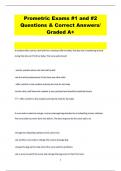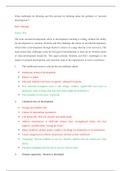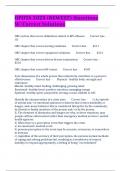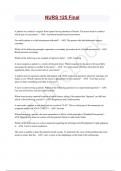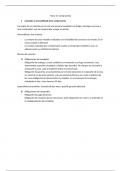Chapter One: Introduction to IBL
1. What is International Business Law
International Business Law governs international business transactions. It has a body of
conventions, treaties, national law and economic practices. It is applicable to commercial
parties (=persons or companies) from different countries.
Public International Law Private International Law
Rights & obligations of states Rights & obligations of
and international natural or legal persons (e.g.
organizations citizens or companies)
War & diplomacy, economic International Business Law
relations, human rights
Sources of IBL:
- International treaties and conventions
- EU law (= supranational law)
- National laws (= primary source of IBL)
- Customs and best practices (= lex mercatoria = common law)
- General principle of law (= natural law)
Best practices: created by precedents, not necessarily written down.
Natural law: something we assume everyone does, like handle in good faith.
1
,Chapter Two: Legal and Ethical Advertising
1. Legal acts and other instruments applicable to advertising
Legal and ethical advertising:
Respect of laws & regulations - minimum requirement
Self-regulatory codes go beyond laws & regulations: Some behaviors may be legal, but still
considered unethical (e.g., Benetton ad in Germany)
Self-regulatory codes differ in scope, for example:
- «ICC Code» applies across sectors worldwide
- «IFPMA Code» applies to pharmaceutical companies worldwide – similar codes apply
in other industries
- «Unilever Principles for Food and Beverage Marketing» apply to Unilever's food and
beverage marketing activities worldwide
The ICC Code = ICC Advertising and Marketing Communications Code
A self-regulatory code. It supplements local, national or regional legislation. National
codes are often based on ICC Code.
Basic principles of the ICC Code:
- Social responsibility
- Decency and honesty
- Truthfulness and substantiation
- Identification and transparency
- Marketer identity
- Fair competition
- Children and teens
EU legislation
EU directive on unfair commercial practices: misleading actions, misleading omissions,
aggressive commercial practices.
EU directive on misleading and comparative advertising: Art 3 misleading advertising, Art 4
comparative advertising.
EU directive on consumer right: right of withdrawal, consumer information for contracts, other
consumer rights (eg delivery, additional payments).
2
,All EU countries Belgium
Transposition of EU directives into Belgian Code of Economic Law, book 6:
national legislation
Hard law - Article 17: comparative advertising
- Article 97-100: misleading commercial
National codes (self-regulation) practices
based on ICC Code - Articles 101-103: aggressive commercial
Soft law practices
Self-regulation
In the context of international business law, "self-regulation" refers to the practice where
businesses and industries voluntarily establish and adhere to their own standards, codes of
conduct, and rules without direct government intervention.
Enforcement:
ICC Code and other self- EU and national legislation
regulation
Not legally binding (soft law) Legally binding (hard law)
Not enforceable before a court EU legislation transposed into
national legislation
But, self-regulating institutions Enforceable before a (national)
offer advice and deal with court
complaints (JEP in Belgium)
JEP = Jury voor Ethische Praktijken inzake Reclame
2. Key stakeholders in advertising
The four key stakeholders are:
- Customers: buyers/users of products and services, these are the targets of
advertising
- Society: customers are also members of society that adhere to norms for decency
and good taste. Non-customers are often unintended recipients of advertising
messages, and can be offended by them.
- Competitors: advertising messaged may be unfair to competitors
- Suppliers (of advertising elements): advertising may use images of people,
endorsements, and other elements which infringe rights.
3. Customer perspective
Misleading advertising
EU Directive on misleading and comparative advertising (Art 3)
Advertising shall not be misleading with regard to:
- The characteristics of the goods and services
- The price or the manner in which the price is calculated
- The nature, attributed and rights of the advertiser
3
, In determining whether advertising is misleading, account shall be taken of all its features,
and in particular of any information it contains concerning:
(a) the characteristics of goods or services, such as their availability, nature, execution,
composition, method and date of manufacture or provision, fitness for purpose, uses,
quantity, specification, geographical or commercial origin or the results to be expected from
their use, or the results and material features of tests or checks carried out on the goods or
services;
(b) the price or the manner in which the price is calculated, and the conditions on which the
goods are supplied or the services provided;
(c) the nature, attributes and rights of the advertiser, such as his identity and assets, his
qualifications and ownership of industrial, commercial or intellectual property rights or his
awards and distinctions.
Misleading advertising is when:
- There are incorrect claims or omissions
- It is likely to deceive the persons to whom it is addressed
- Likely to affect their economic behavior
‘misleading advertising’ means any advertising which in any way, including its presentation,
deceives or is likely to deceive the persons to whom it is addressed or whom it reaches and
which, by reason of its deceptive nature, is likely to affect their economic behavior or which,
for those reasons, injures or is likely to injure a competitor;
Likely to affect economic behavior: customer might not have bought product if they had full
information.
ICC Code, Art 4 Honesty
Marketing communications should be so framed as not to abuse the trust of consumers or
exploit their lack of experience or knowledge. Relevant factors likely to affect consumers’
decisions should be communicated in such a way and at such a time that consumers can
take them into account.
ICC Code, Art 5 Truthfulness
Marketing communications should be truthful and not misleading. Marketing
communications should not contain any statement, claim or audio or visual treatment which,
directly or by implication, omission, ambiguity or exaggeration, is likely to mislead the
consumer, in particular, but not exclusively, with regard to: characteristics of the product
which are materials, i.e. likely to influence the consumer’s choice
! Hyperbolic advertising: eg Evian advertising with babies. It will not get you sued, the
average customer should know it is a joke.
An omission refers to the act of leaving something out or neglecting to do something.
4



